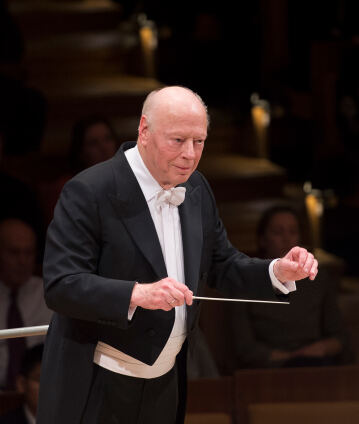Bernard Haitink conducts Schubert and Mahler

They are among the most expressive symphonic works ever: Mahler’s Lied von der Erde and Schubert’s Unfinished Symphony. An exciting conceptual parallel can be drawn by juxtaposing them: in both cases, fragile folksy gaiety suddenly changes into sheer despair. Besides Bernard Haitink, who is especially highly esteemed as a Mahler interpreter, you can experience tenor Christian Elsner and baritone Christian Gerhaher.
Schubert’s “path to the great symphony” was long and difficult: he completed only seven of the total of 13 works that he wrote – or rather began writing – in the genre; only with the “Great” C major symphony composed in 1825 did he achieve a breakthrough, making him the initiator of the romantic symphony after Beethoven. Schubert had already got quite close to this aim with his Unfinished, as in the two movements handed down completely he resolved a central compositional problem of the time in a highly original way (the form of the sonata movement focussed on expansion with one self-contained, songlike theme), by re-defining the function of the themes and their periodic structure in the scope of the traditional sonata movement – a process that later Gustav Mahler also used, a composer who recognised the path-breaking potential of Schubert’s oeuvre at an early stage: already at one of his first concert performances in Iglau on 31 July 1876 he programmed Schubert’s Wanderer Fantasy; later Mahler regularly conducted symphonies such as the Unfinished and the “Great” C major, and performed numerous Schubert Lieder at the piano.
While in his song cycles Mahler picked up compositionally directly on Schubert’s Schöne Müllerin, he took up the mood of the Winterreise in his Lied von der Erde – an exceptional work that makes the finiteness of human existence its central theme, composed in a time in which the composer stood, in his own words, “vis-à-vis de rien”. Bernard Haitink, guest conductor of the Philharmonic since 1964 and one of the outstanding Mahler interpreters of our time, turns, after Schubert’s Unfinished, to Mahler’s work. It bids farewell to the world, and after the catastrophic climax of the last movements seems to fade away into infinity with an open ending: the text flows into the word “ewig” [eternal], accented by gently floating tone lines; the music seems to gradually dissipate while the word is repeated a multitude of times. The tenor is Christian Elsner, while baritone Christian Gerhaher takes on the second solo, which is usually sung by an alto: as early a conductor as Bruno Walter at the first performance in Vienna substituted the alto with the baritone Friedrich Weidmann, who was esteemed by Mahler – after all, the composer himself, originally unsure about the distribution of the voices, subtitled the Lied von der Erde on the engraver’s copy “A Symphony for Tenor and an Alto or Baritone Voice and Orchestra”.
© 2016 Berlin Phil Media GmbH
Related interview
Artists
Our recommendations
- Simon Rattle and Christian Gerhaher
- Christian Thielemann conducts Brahms’s “Deutsches Requiem”
- “Pelléas et Mélisande” with Simon Rattle, Christian Gerhaher and Magdalena Kožená
- Sir Simon Rattle conducts Wagner’s “Die Walküre”
- Simon Rattle conducts Schumann’s “Paradise and the Peri”
- Iván Fischer and Christian Gerhaher